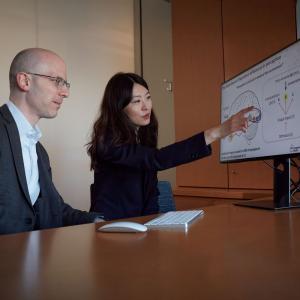This article is part of Robbed of Her Hearing, a Classical Musician Finally Finds a Diagnosis & Novel Path to Recovery.
Surgery for an acoustic neuroma, a tumor commonly caused by neurofibromatosis type 2, may require a tragic tradeoff: removing or damaging the facial nerve to excise the lesion. But facial paralysis, which usually affects one side of the face, impacting both function and appearance, can also be caused by a host of other conditions, including a head injury, infection, stroke, or Bell’s palsy. Facial paralysis affects tens of thousands of Americans, but “every patient is different,” explains J. Thomas Roland Jr., MD, chair of the Department of Otolaryngology—Head and Neck Surgery at NYU Grossman School of Medicine. “The duration might be short or long. The function of certain nerves might be present or might not. The best treatment might be medical, surgical, rehabilitative, or all three.”
In 2014, recognizing the need for a comprehensive approach to care, Dr. Roland established NYU Langone’s Facial Paralysis and Reanimation Center, which marshals the expertise of clinical specialists from numerous disciplines. The only program of its kind in New York City, it draws nearly 100 patients each year, many with complex cases, from all over. “We have the capacity to do all kinds of things, even for patients with very prolonged facial paralysis,” says Dr. Roland. “Our spectrum of talent enables us to tell patients with full confidence that we can offer them an option that hasn’t been tried before or wouldn’t be available at most centers.”
At the heart of the center is its monthly case conference, led by Judy W. Lee, MD, director of the Division of Facial Plastic and Reconstructive Surgery, and Adam S. Jacobson, MD, director of the Division of Head and Neck Surgery. “We’re very thoughtful about how we approach our reanimations,” says Dr. Jacobson. “There’s no pioneering technique that is not being done right here.” Dr. Jacobson trained as an oncologic and reconstructive surgeon, but he transitioned to facial reanimation surgery to address what he felt was a void in postoperative care. “I wanted to give my patients with cancer a better outcome after sacrificing the facial nerve to remove a tumor,” he explains.
Allison Most, NP, the center’s patient coordinator, also finds it deeply rewarding to work with this patient population. “I love the work we do,” she says, “because we’re giving something back instead of taking something away.”

